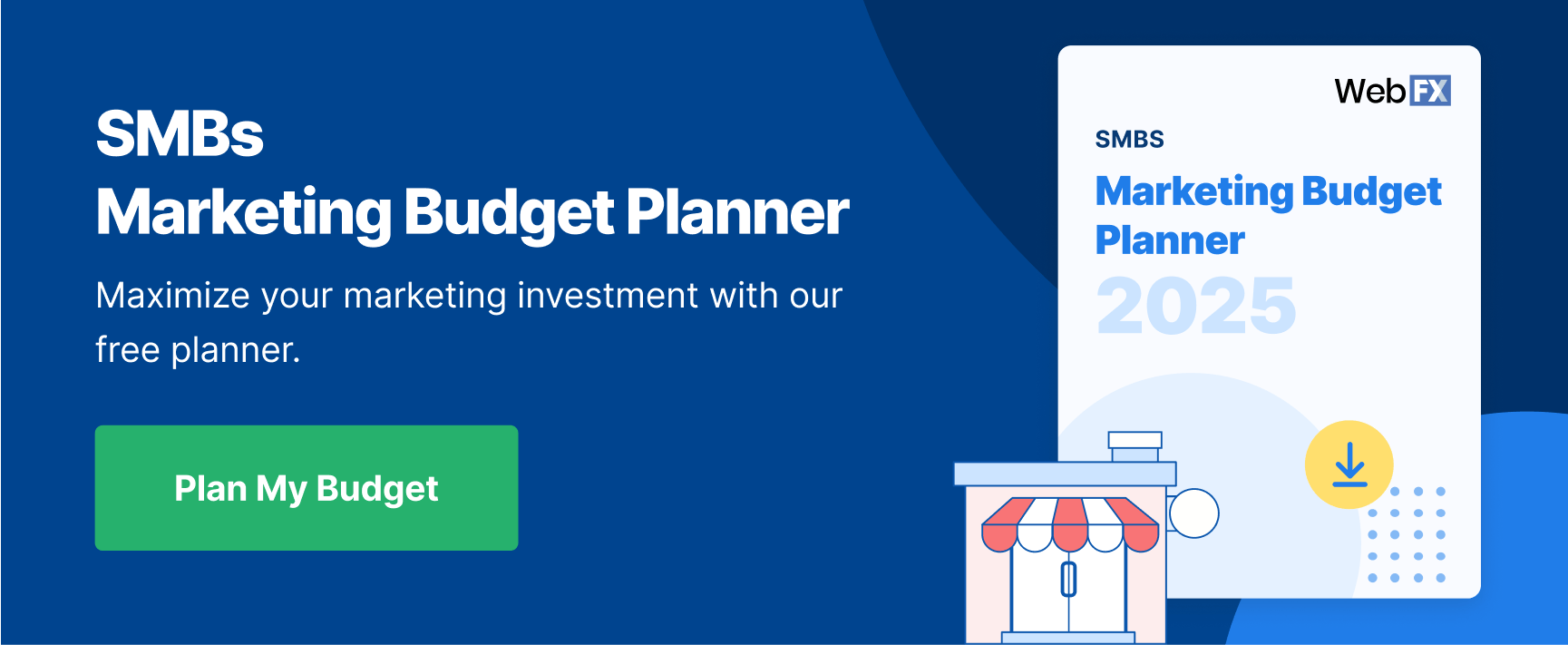- Home
- Industries
- General
- Small Businesses
- smb marketing budget
How To Build Your 2025 Marketing Budget
Part of planning and running an SMB includes your marketing budget. With a planned-out budget, you can dedicate funds to marketing your business and save yourself time and stress down the road when finding funds for projects.
-
insights from 149,000+ hours of small business marketing experience
How much do SMBs spend on marketing?
The cost of digital marketing for small to mid-size businesses (SMB) is $2,500 to $12,000 per month, on average.
Part of planning and running an SMB includes your marketing budget. With a planned-out budget, you can dedicate funds to marketing your business and save yourself time and stress down the road when finding funds for projects.
Here’s what we will cover:
- How much do SMBs spend on marketing?
- SMB marketing budget breakdown
- Factors that impact SMB marketing budgets
- How to create an SMB marketing budget
- FAQ on SMB marketing budgets
Download Now: Our Free SMB Budget Planner
How much do SMBs spend on marketing?
The cost of digital marketing for SMBs is $2,500 to $12,000 per month, on average. Around 55% of SMBs spend less than $50,000 per year. The total dollar amount that you spend may vary greatly depending on your industry, location, revenue, and company size.
SMB marketing budget breakdown
The cost of digital marketing will depend on many factors, but it can be helpful to know what people are paying per month. Let’s look at what SMBs are paying for top digital marketing services below:
|
2025 SMB Marketing Spend |
|
| Channel | Monthly Spend |
| Search engine optimization | $2,500–$7,500 |
| Paid advertising | $100–$10,000 |
| Social Media | $100–$5,000 |
| Email Marketing & SMS | $50–$100 |
| Content Marketing | $5,000–$10,000 |
| Web Design | $501–$5,000 (annually) |
Factors that impact SMB marketing budgets
Before you start building your marketing budget for small businesses, you need to know what will impact how much you spend. Here are some key factors that impact your budget:
- Business to business (B2B) vs. business to consumer (B2C): The tools you use to reach your audience will change depending on whether you are B2B or B2C. B2B clients might focus more on lead generation, while B2C clients might invest more in SEO, which affects your budget.
- Market conditions: Your market will also impact how much you need to budget for marketing. If you have a competitive, saturated market, you might need to spend more to get exposure than you would in a small, niche market.
- Business growth goals: You don’t need to invest more to see positive results. However, if you want more growth quickly, you might spend more of your budget on PPC over SEO, which is more of a continual process.
- Location: Your location will also impact your budget and marketing spend. If you work in a congested area, like a bigger city, it will be more challenging to stand out than if you operate in a smaller town. You also might have more or less competitors depending on your location.
How to create an SMB marketing budget
Now it’s time to establish your goals for your small business marketing budget. Here’s how to prepare your marketing budget for 2025 in six steps:
1. Establish your goals
Before you can create a budget, you need to establish your marketing goals. Setting goals will help you guide your marketing spend toward actionable items, rather than blowing it on solutions that you can’t measure.
Some example goals include:
- Earning X more revenue each month
- Boosting your online subscribers by a certain amount
- Upping the average order cost per customer
- Generating a set number of leads each quarter
2. Calculate your available revenue
You also need to determine how much revenue your company brings in each month or year. You want to give yourself room for error, especially if your sales are more seasonal or inconsistent over the year. Figure out how much revenue you can reasonably set aside for marketing while covering all your other business expenses as well.
3. Research your competition
Understanding what your competitors spend their money on can help guide your budget. For example, 43.57% of companies spend the same amount on marketing as others in their industry. That means you should strive to meet the standards set by your competitors.
Look at what strategies they use and refer to the costs to see how much they spend on average.
4. Consider past performance
You can’t build a marketing budget without understanding how your current strategies are working. Look at your past marketing performance to see what channels drive the highest ROI and which you can consider removing from your budget.
Your goal should be to invest more in the strategies that you know drive revenue for your business.
5. List all potential costs
Now, you can start outlining the costs that you want to contribute your budget toward. For example, say you want to invest in SEO. Your budget for SEO should include any outsourcing, tools, and ongoing support that you may need.
Make a list of potential costs for each channel that you want to include in your campaign. This will help you be more realistic about what you have to spend and remove some surprise costs.
6. Adjust to maximize ROI
Remember that your budget doesn’t have to be set in stone. While it is important to have a clear plan, you might find ways to improve or change it as time goes on. Be sure to look at your budget throughout the year to optimize it for your success.
FAQs for marketing budgets for small businesses
How much should SMBs spend on marketing?
SMBs should plan to spend $2,500 to $12,000 per month, on average, to compete with other businesses in their industry. However, that number will change to suit your needs and available resources. You should only spend what is comfortable to help your business grow.
What’s an average marketing budget for small businesses?
An average marketing budget for SMBs is between 7-10% of their revenue. This percentage may change depending on factors like your company size, your available revenue, and your in-house marketing resources.
How often should I evaluate my SMB marketing budget?
We recommend evaluating your budget annually to set yourself up for a successful year. However, you can assess and tweak your budget each quarter to make sure you are on track with spending and making progress.
Take control of your budget with help from WebFX
Planning your budget is easier with a partner. That’s where we come in!
As a leading marketing agency for SMBs, we understand the time and resources that go into running your company. We offer digital marketing services that earn the highest ROI for your industry. With our help, your digital marketing campaigns will drive revenue and take full advantage of every dollar you set aside.
Contact us online to learn how our marketing services can increase your business’s revenue and keep your budget growing for years to come!
We Drive Results for Small Businesses
- Dedicated account manager backed by 500+ digital experts
- Renowned for our communication and transparency



We Drive Results for Small Businesses
- Dedicated account manager backed by 500+ digital experts
- Renowned for our communication and transparency



Explore our case studies
Read our case studies for a more in-depth look at our results.
Solving key challenges for small businesses
We aren’t driving enough traffic to our website
Skyrocket your online visibility with industry-leading digital marketing services that boost your rankings in relevant search results and drive qualified traffic to your website.

We’re struggling to attract new prospects
At WebFX, our team of strategists will help you craft revenue-driving lead generation and marketing strategies that attract high-value leads and prospects to your company.

We’re struggling to stay ahead of our competitors
Staying one step ahead of your competitors is critical for continuously attracting new customers and steady sales for your business. Our marketing services put a shining spotlight on your company to outshine the competition every time.

Our marketing efforts aren’t providing a high return
Our data-driven marketing efforts leverage data from your audience, website, strategies, and more to ensure your marketing dollars go toward the campaigns that will provide the highest ROI.



